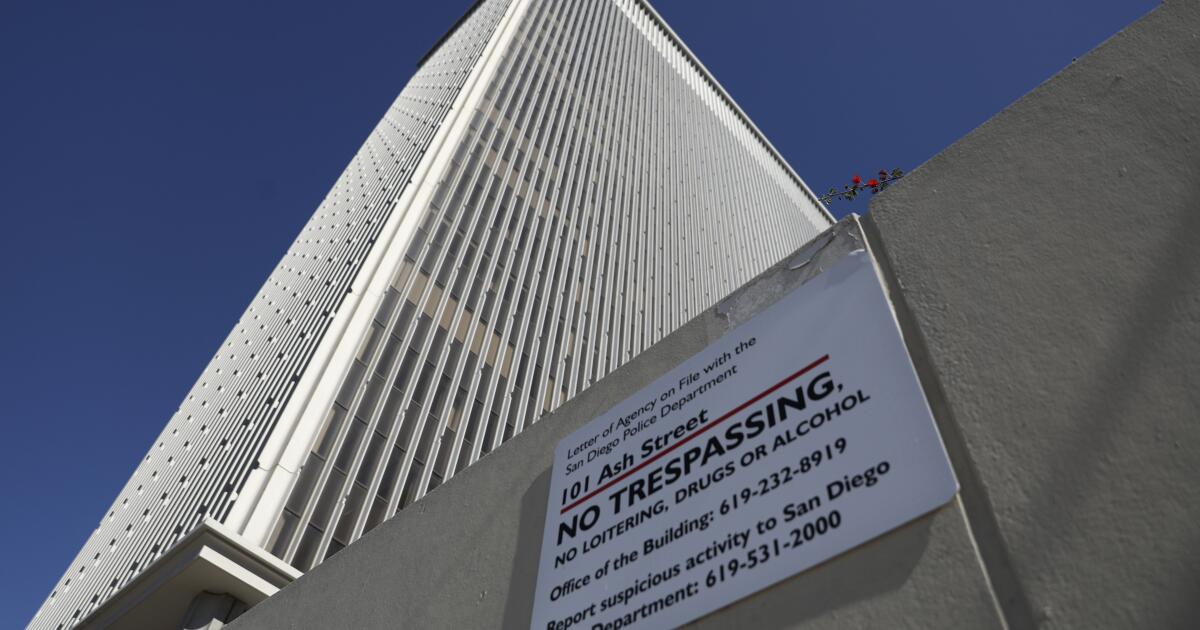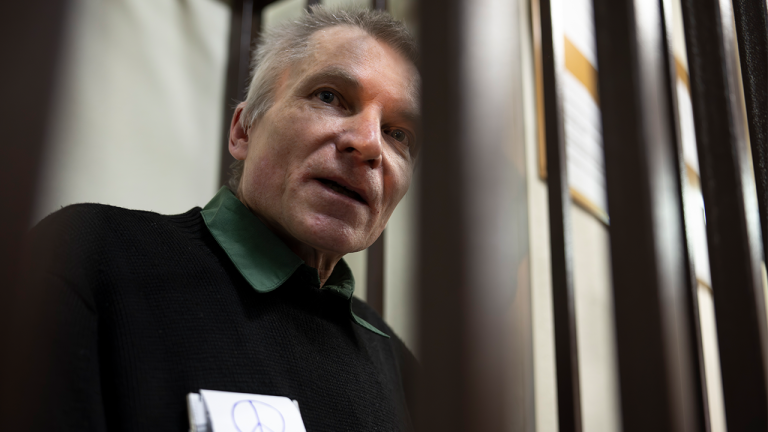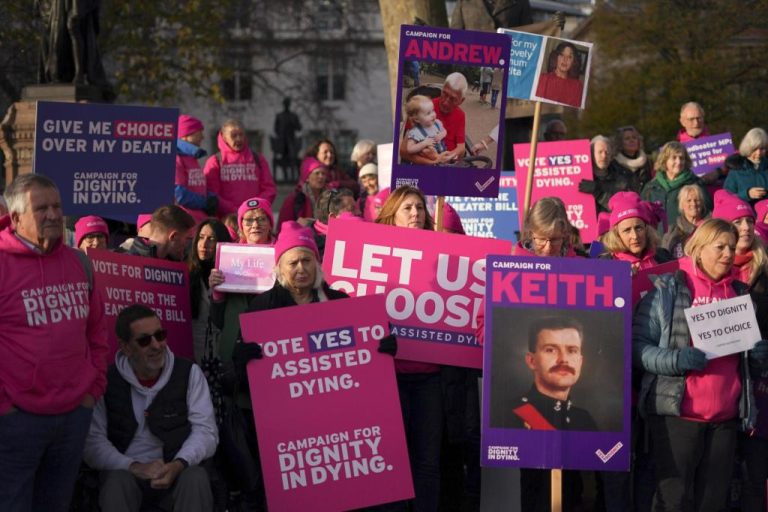
The public drama has waned over the year and a half since Mayor Todd Gloria and a majority of the San Diego City Council decided to buy out the disputed lease for the 101 Ash St. tower at 100 cents on the dollar — and indemnify the landlord and lender from future litigation.
But the legal challenge to the initial deal has been pressing forward ever since Superior Court Judge Joel Wohlfeil summarily dismissed a lawsuit from San Diego taxpayer John Gordon weeks before it was scheduled to go to trial.
The Gordon legal team appealed that decision to the 4th District Court of Appeal, and the final briefs in the case were submitted last week.
The appeals court is now expected to schedule oral arguments before deciding whether Wohlfeil wrongly dismissed their lawsuit alleging that the city’s acquisition of the high-rise, pushed by former Mayor Kevin Faulconer and approved by the council in 2016, violated the state constitution.
Lawyers for Gordon argued that Wohfeil should have allowed a jury to decide whether the complicated financial deal was unconstitutional — and whether millions of dollars paid to a broker who was advising the city wrongly inflated the cost.
They want the 4th District to reverse the judge’s decision, which left San Diego in possession of a building that cannot be safely occupied, and send the case back to a jury.
“Who and what caused the 101 Ash St. building to be unusable and un-occupiable are questions of fact,” Gordon attorney Maria Severson wrote in her 57-page filing. “The trial court could not grant a summary judgment to resolve the dispute.”
Attorneys for the city, the landlord and the lender also filed their own separate briefs with the 4th District, arguing that the Wohlfeil ruling should be upheld.
Among other things, they say the appeal is moot because the city settled its litigation against landlord Cisterra Development and lender CGA Capital. They also note the city bought out the lease at the heart of the appeal.
“Despite plaintiff’s hyperbolic reference to dramatic but irrelevant facts, grossly misleading innuendo and facts taken out of context, resolution of this appeal boils down to two very simple legal concepts: mootness and lack of standing,” lawyers for Cisterra told the appellate judges.
In one of its filings, the City Attorney’s Office also noted the lease had been terminated as a result of the settlement.
City Attorney Mara Elliott, who previously had publicly opposed the mayor’s settlement and urged the council not to approve it, also said in her filing that the judge in the Gordon case had correctly ruled that no public funds were wasted.
“The trial court ruled: ‘The city derives some minimal benefit such that the lease is a permissible contingent obligation,’” the city brief notes.
“Expenditures toward the lease do ‘not constitute [waste] of public funds as a matter of law,’” it says.
CGA Capital officials did not respond to requests for comment on the appeal. An attorney for Cisterra said the company’s court filings speak for themselves.
The city is still on the hook for $24 million in prior rent paid for the vacant building and the $86 million buyout — the cash value of the remaining lease term. The $126 million the city borrowed to pay off the leases will cost more than $218 million to repay over the next 30 years.
City taxpayers are also responsible for legal fees related to the ongoing litigation, including those accrued by Cisterra and CGA Capital.
Seven-year history
San Diego acquired the former Sempra Energy headquarters seven years ago as part of an effort to upgrade employee workspace and protect taxpayers from rising commercial rents downtown.
The arrangement called for the city to pay $128 million over 20 years, or $535,000 a month, though the building had previously been appraised at $67 million under the assumption that it was fully functional. City officials never secured an independent valuation.
The complicated transaction, known as a credit-tenant lease, had Cisterra borrowing $92 million from CGA Capital the same day escrow closed. Cisterra immediately assigned rent payments to a trust formed by the lender.
The Faulconer administration told the council the 19-story office tower was in good condition and needed only a $10,000 power scrub before workers could be moved in. In fact, the property needed tens of millions of dollars in upgrades and repairs.
During three years of renovation, the city was repeatedly cited by county regulators for asbestos violations. Work was delayed and costs climbed, but by late 2019 San Diego officials transferred 1,100 employees into the building.
They didn’t stay long.
In January 2020, the county issued another asbestos violation on the property and Faulconer ordered an evacuation that remains in effect today.
Gordon, a private citizen who works as a restaurant consultant, sued the city in August 2020, claiming that the lease was an illegal waste of public funds because the building could not be safely occupied.
The following month, the Faulconer administration announced it would stop making the $535,000 monthly payments on the building, citing a provision in the state constitution that bars cities from going into debt with neither a public vote nor any immediate benefit.
By October of that year, City Attorney Mara Elliott filed her own lawsuit, asking a judge to order the rent be set aside until the building could be safely occupied.
One consultant said it would cost $115 million to bring the Ash Street high-rise into working order.
Millions in new debt
In June 2021, lawyers for real estate broker Jason Hughes publicly acknowledged their client had collected a total of $9.4 million from the Ash Street deal and a similar contract for the nearby Civic Center Plaza after he previously served as an unpaid volunteer adviser to the city.
Elliott amended her lawsuits to add Hughes as a defendant in her cases. She and Gloria, who as a council member in 2016 had made the motion to approve the Ash Street lease, issued a joint statement saying they had been duped by Hughes and perhaps others.
District Attorney Summer Stephan opened a criminal investigation into both leases, and by that October she had agents search Cisterra’s headquarters as well as Hughes’ home and office.
Hughes has repeatedly said he told Faulconer and five other senior city officials that he would seek to be paid for his services, citing a letter he sent to the city’s real estate director that she accepted and signed. Faulconer and others denied knowing anything about the millions Hughes received.
By mid-2022, as mayor, Gloria was pushing to settle the city’s Ash Street-related lawsuits.
Led by council President Sean Elo-Rivera, a majority of the City Council agreed that July to sell bonds to pay off the two office towers.
The following month, Wohlfeil said in court that Gordon had a “reasonable probability” of winning at trial. But the judge nonetheless began granting motions for summary dismissal brought by Cisterra, CGA Capital and the city.
With the city’s civil dispute resolved, prosecutors quickly moved to close out their criminal case.
Last March, Hughes pleaded guilty to a single misdemeanor conflict-of-interest charge and agreed to return $9.4 million to the city.
He was sentenced to one year of unsupervised probation and fined $400. No one else was charged.
Trial by jury?
In their appeal of the dismissal, Gordon’s lawyers say the matters at issue are questions of fact that should be decided by a jury, not a judge.
Among other things, the appeal singles out an issue known as abatement — the legal ability to cancel or abate lease payments if a property is rendered unusable.
A city lease must include an abatement clause in case the property cannot be used, Gordon said.
Gordon also asserted that the Ash Street agreement was illegal because the city assumed $92 million in debt over 20 years without going to a vote and without any immediate benefit to the public, as the California Constitution requires.
In tort law, both sides in a contract are granted what’s called consideration — a direct benefit from the agreement.
Gordon argues the city received no consideration because the building was unusable; the defendants disagree, saying the city had full access to the property as soon as the lease was signed.
The appeal also claims the cost of the building was illegally inflated by the fees paid to Hughes and that officials shirked their obligation to void the lease and recover any ill-gotten gains.
“The city had a mandatory duty to seek a legal decision rescinding the agreement and disgorging payments made under the agreement,” the Gordon brief says.
The Cisterra lawyers blamed the building’s condition on city officials whose flawed renovations they said had made the building unsafe to occupy. If the city had not disturbed asbestos by removing walls in an effort to squeeze more workers into the building, there would have been no violations, they argued.
The Gordon lawyers said that question and others should be decided by a jury.
“There is sufficient evidence for a jury to find that asbestos was a pre-existing problem, as were the mechanical, electrical and HVAC defects that rendered the building functionally obsolete,” they said.
There is no indication when the appeals judges may schedule oral arguments.








